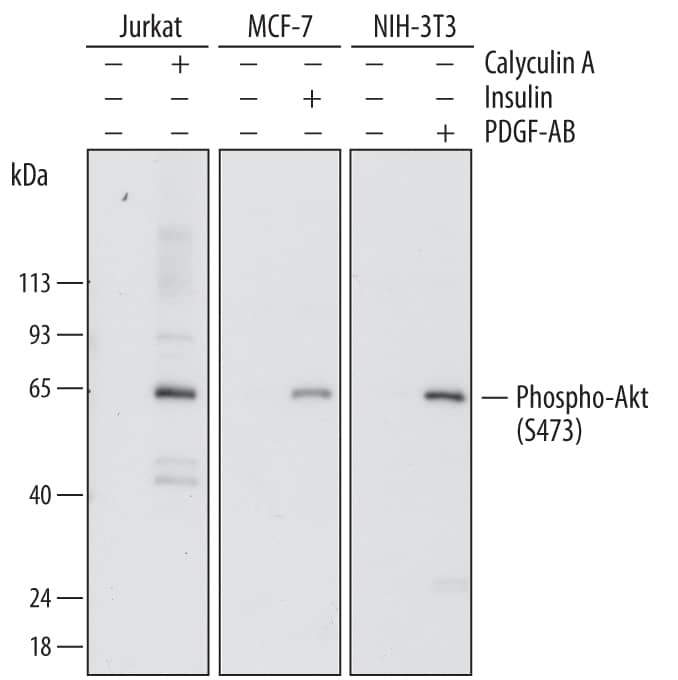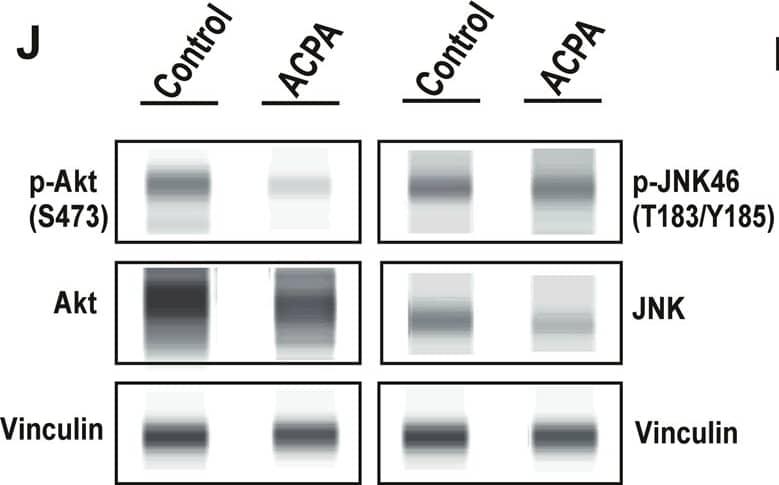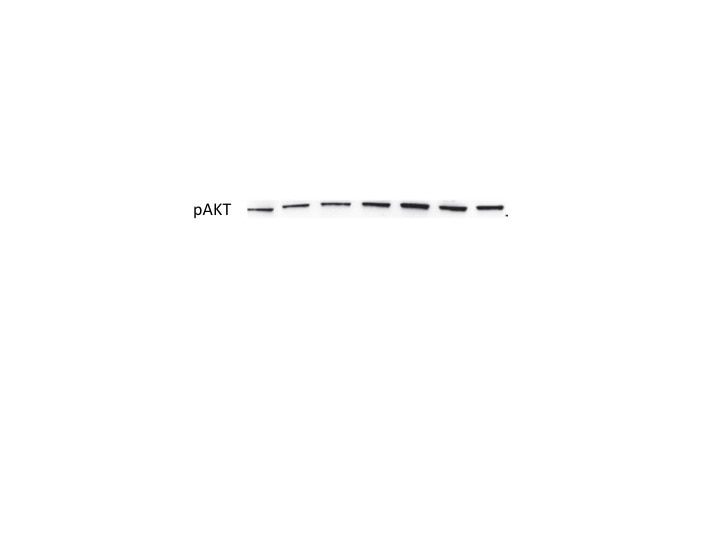Human/Mouse Phospho-Akt (S473) Pan Specific Antibody Summary
Applications
Please Note: Optimal dilutions should be determined by each laboratory for each application. General Protocols are available in the Technical Information section on our website.
Scientific Data
 View Larger
View Larger
Detection of Human and Mouse Phospho-Akt (S473) by Western Blot. Western blot shows lysates of Jurkat human acute T cell leukemia cell line, MCF-7 human breast cancer cell line, and NIH-3T3 mouse embryonic fibroblast cell line untreated (-) or treated (+) with 100 nm Calyculin for 30 minutes, 1 µg/mL insulin for 5 minutes, or 100 ng/mL Recombinant Human PDGF-AB (Catalog # 222-AB) for 20 minutes. PVDF membrane was probed with 0.2 µg/mL of Mouse Anti-Human Phospho-Akt (S473) Pan Specific Monoclonal Antibody (Catalog # MAB887) followed by HRP-conjugated Anti-Mouse IgG Secondary Antibody (Catalog # HAF007). A specific band was detected for Phospho-Akt (S473) at approximately 65 kDa (as indicated). This experiment was conducted under reducing conditions and using Immunoblot Buffer Group 1.
 View Larger
View Larger
Detection of Human Phospho-Akt (S473) by Simple WesternTM. Simple Western lane view shows lysates of MCF-7 human breast cancer cell line untreated (-) or treated (+) with 100 ng/mL Recombinant Human IGF-I (Catalog # 291-G1) for 20 minutes, loaded at 0.2 mg/mL. A specific band was detected for Phospho-Akt (S473) at approximately 65 kDa (as indicated) using 2 µg/mL of Mouse Anti-Human/Mouse Phospho-Akt (S473) Pan Specific Monoclonal Antibody (Catalog # MAB887). This experiment was conducted under reducing conditions and using the 12-230 kDa separation system.
 View Larger
View Larger
Detection of Human AKT by Simple Western ACPA inhibits p-Akt, induces p-JNK and affects levels of specific metabolites in NSCLC lines.a Principal component analysis (PCA) score plot: Metabolomics profiling of control and ACPA-treated A549, H1299, H358, and H838 cells. b Changes in variable importance in projection (VIP) values for 19 metabolites in A549 cells. c, d, e Changes in VIP values for 20 metabolites in H1299, H358, and H838 cells. Significantly changed metabolites (*p < 0.05, indicated by arrows) were matched to apoptotic pathways. f, g, h, i Increase and decrease in several metabolites of ACPA-treated A549, H1299, H358, and H838 cells (*p < 0.05). j Simple Western showing total Akt, p-Akt (S473), total JNK46 and JNK54 and p-JNK46 and p-JNK54 (T183/Y185) in A549 cells at 24 hours after treatment with IC50 dose of ACPA. k Relative expression levels of Akt and p-Akt for control and ACPA-treated A549 cells after normalization by total vinculin protein. l Relative expression levels of JNK (46 and 54 kDa) and p-JNK for control and ACPA-treated A549 cells after normalization by total vinculin protein. *p < 0.05, Student’s t-test. All tests were done in quadruplicates. Image collected and cropped by CiteAb from the following publication (https://pubmed.ncbi.nlm.nih.gov/33431819), licensed under a CC-BY license. Not internally tested by R&D Systems.
Reconstitution Calculator
Preparation and Storage
- 12 months from date of receipt, -20 to -70 °C as supplied.
- 1 month, 2 to 8 °C under sterile conditions after reconstitution.
- 6 months, -20 to -70 °C under sterile conditions after reconstitution.
Background: Akt
Akt, also known as protein kinase B (PKB), is a central kinase in such diverse cellular processes as glucose uptake, cell cycle progression, and apoptosis. Three highly homologous members define the Akt family: Akt1 (PKB alpha ), Akt2 (PKB beta ), and Akt3 (PKB gamma ). All three Akts contain an amino-terminal pleckstrin homology domain, a central kinase domain, and a carboxyl-terminal regulatory domain. Akt1 is the most widely expressed family member and is frequently activated in a number of carcinomas, including breast, prostate, lung, pancreatic, liver, ovarian, and colorectal cancer. Akt1 is activated in a multistep process that involves the sequential phosphorylation of Thr450 by JNK kinases, Thr308 by PDK1, and Ser473 by PDK2 or mTORC2. Activated Akt1 phosphorylates a wide variety of cytosolic, nuclear, and mitochondrial substrates. Human Akt1 shares 98% aa sequence identity with mouse and rat Akt1.
Product Datasheets
Citations for Human/Mouse Phospho-Akt (S473) Pan Specific Antibody
R&D Systems personnel manually curate a database that contains references using R&D Systems products. The data collected includes not only links to publications in PubMed, but also provides information about sample types, species, and experimental conditions.
11
Citations: Showing 1 - 10
Filter your results:
Filter by:
-
Pten knockout affects drug resistance differently in melanoma and kidney cancer
Authors: Klaudia Brodaczewska, Aleksandra Majewska, Aleksandra Filipiak-Duliban, Claudine Kieda
Pharmacol Rep
-
The proprotein convertase furin regulates the development of thymic epithelial cells to ensure central immune tolerance
Authors: Liang Z, Zhang Z, Zhang Q et al.
iScience
-
Hyaluronic acid restored protein permeability across injured human lung microvascular endothelial cells
Authors: Shinji Sugita, Yoshifumi Naito, Li Zhou, Hongli He, Qi Hao, Atsuhiro Sakamoto et al.
FASEB BioAdvances
-
miRNA Pattern in Hypoxic Microenvironment of Kidney Cancer-Role of PTEN
Authors: Majewska A, Brodaczewska K, Filipiak-Duliban A et al.
Biomolecules
-
LncCDH5-3:3 Regulates Apoptosis, Proliferation, and Aggressiveness in Human Lung Cancer Cells
Authors: K Kwa?niak, J Czarnik-Kw, K Malysheva, K Pogoda, O Korchynsky, P Rybojad, B Karczmarek, J Tabarkiewi
Cells, 2022-01-23;11(3):.
Species: Human
Sample Types: Cell Lysates
Applications: Western Blot -
Secretome of endothelial progenitor cells from stroke patients promotes endothelial barrier tightness and protects against hypoxia-induced vascular leakage
Authors: Rodrigo Azevedo Loiola, Miguel García-Gabilondo, Alba Grayston, Paulina Bugno, Agnieszka Kowalska, Sophie Duban-Deweer et al.
Stem Cell Research & Therapy
-
ACPA decreases non-small cell lung cancer line growth through Akt/PI3K and JNK pathways in vitro
Authors: Ö Boyac?o?lu, E Bilgiç, C Varan, E Bilensoy, E Nemutlu, D Sevim, Ç Kocaefe, P Korkusuz
Cell Death & Disease, 2021-01-11;12(1):56.
Species: Human
Sample Types: Cell Lysates
Applications: Western Blot -
PD-L1 engagement on T cells promotes self-tolerance and suppression of neighboring macrophages and effector T cells in cancer
Authors: B Diskin, S Adam, MF Cassini, G Sanchez, M Liria, B Aykut, C Buttar, E Li, B Sundberg, RD Salas, R Chen, J Wang, M Kim, MS Farooq, S Nguy, C Fedele, KH Tang, T Chen, W Wang, M Hundeyin, JAK Rossi, E Kurz, MIU Haq, J Karlen, E Kruger, Z Sekendiz, D Wu, SAA Shadaloey, G Baptiste, G Werba, S Selvaraj, C Loomis, KK Wong, J Leinwand, G Miller
Nat. Immunol., 2020-03-09;21(4):442-454.
Species: Human, Mouse
Sample Types: Whole Cells
Applications: Flow Cytometry -
MicroRNA‑214 suppresses the viability, migration and invasion of human colorectal carcinoma cells via targeting transglutaminase 2
Authors: Huiguo Shan, Xuefeng Zhou, Chuanjun Chen
Molecular Medicine Reports
-
Endocrine responses and acute mTOR pathway phosphorylation to resistance exercise with leucine and whey
Authors: MT Lane, TJ Herda, AC Fry, MA Cooper, MJ Andre, PM Gallagher
Biol Sport, 2017-01-20;34(2):197-203.
Species: Human
Sample Types: Tissue Homogenates
Applications: Infared Microscopy, Western Blot -
17 beta -estradiol suppresses hyperoxia-induced apoptosis of oligodendrocytes through paired-immunoglobulin-like receptor B
Authors: HUA WANG, JINLIN WU
Molecular Medicine Reports
FAQs
No product specific FAQs exist for this product, however you may
View all Antibody FAQsReviews for Human/Mouse Phospho-Akt (S473) Pan Specific Antibody
Average Rating: 5 (Based on 2 Reviews)
Have you used Human/Mouse Phospho-Akt (S473) Pan Specific Antibody?
Submit a review and receive an Amazon gift card.
$25/€18/£15/$25CAN/¥75 Yuan/¥2500 Yen for a review with an image
$10/€7/£6/$10 CAD/¥70 Yuan/¥1110 Yen for a review without an image
Filter by:
















